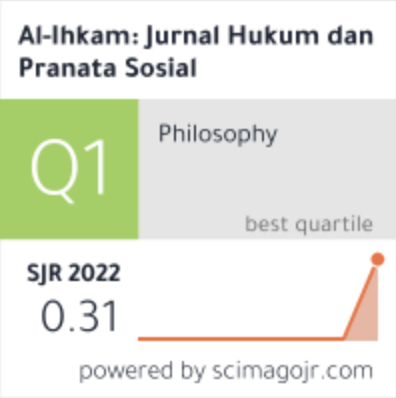Distribution of Poh Roh Asset Due to Divorce in Gayo Lues Community Aceh
 Abstract views: 287
,
Abstract views: 287
,
 PDF downloads: 246
PDF downloads: 246
Abstract
This research was conducted in Kute Lintang Village, Blangkejeren Sub-district of Gayo Lues Regency, which discussed the poh roh assets, according to the Gayo Lues customary law, a discussion about the distribution of poh roh assets in the Gayo Lues community. This research applied descriptive method with a normative juridical approach to obtain secondary data, sociological juridical approach, and field research. The distribution system of poh roh assets due to divorce can be done in 2 (two) ways, namely by consensus and carried out through jeuma opat. The conciliation process carried out by divorced husband and wife ussually carried out by way of deliberations involving family relatives from both huband and wife. Whereas dispute resolution through jeuma opat emphasizes family aspects through deliberations to reach consensus, so none from the husband or wife feels defeated or won and jeuma opat knows about the origin of the assets obtained during their marriages, which are inherited assets, where inheritance is obtained from heirs of husband and wife and where are the poh roh assets, then simplify jeuma opat in terms of dividing the poh roh assets if there is a divorce because it already knows the origin of the divorced husband and wife's assets. Legal Consequences if the poh roh assets not shared After the divorce in Gayo Lues is the status of the poh roh assets will be not clear, it means that the husband and wife can no longer separate which is inherited from poh roh assets, even between the inheritance and the poh roh assets has been mixed, so it is very it is difficult to determine the status of property in a marriage.
Downloads
References
Abdul Manan, Hukum Materiel dalam Praktek Peradilan Agama. Jakarta: Pustaka Bangsa, 2003.
Rien G. Kartasoepoetra, Pengantar Ilmu Hukum Lengkap. Jakarta: Penerbit Bina Aksara, 1988.
Hilman Hadikusuma, Hukum Perkawinan Indonesia menurut Perundangan, Hukum Adat, Hukum Agama, Bandung: Mandar Maju, 2003.
Agus Trisaka in Muhammad Saifuddin, et.all, Hukum Perceraian, Jakarta: Sinar Grafika, 2013.
Benda Beckmann, F & K, 2006: ix, in Sulistyowati Irianto (ed), 2009, Hukum yang Bergerak. Tinjauan Antropologi Hukum, Yayasan Obor Indonesia, Jakarta.D.Y. Witanto. Hukum Acara Mediasi,Bandung: Alfabeta, 2011.
Griffiths, J., 1986 in Abdias dkk, Potret Pluralisme Hukum dalam Penyelesaian Konflik Sumber Daya Alam. Pengalaman dan Perspektif Aktivis, Jakarta: HUMA, 2007.
George Ritzer and Doglas J. Goodman, Teori Sosiologi Modern (Modern Sosiological Theory). transl by Alimandan, Jakarta: Prenada, 2007.
H.F.A. Vollmar, Pengantar Studi Hukum Perdata, Rajawali, Jakarta, 1983.
Hurgronje, C. Snouck. Tanah Gayo dan Penduduknya. Jakarta: INIS, 1995.
Het Gajoland en Zijne Bewoners. transl. Hatta Hasan Aman Asnah. Gayo; Masyarakat dan Kebudayaannya Awal Abad ke-20. Jakarta: Balai Pustaka, 1996.
John Griffiths, “Memahami Pluralisme Hukum, Sebuah deskripsi Konseptual”, in Tim HuMa (ed), 2005.
J. Andy Hartanto. Hukum Harta Kekayaan, Surabaya: Laksbag Grafika, 2012.
Laura Nader & Harry F. Todd Jr, The Disputing Process Law in Ten Societies, New York: Columbia University Press, 1978.
Taqwaddin dalam Nurdin, “Pedoman Penyelenggaraan Peradilan Perdamaian Adat di Aceh,” Jurnal Ilmu Hukum Qanun No. 50 ILX (Banda Aceh: Fakultas Hukum, 2010).
Mulyadi, “Hukum Perkawinan Indonesia”, Semarang: Badan Penerbit Universitas Diponegoro, 2008.
Pound, Roscoe. in Lili Rasjidi, Dasar- Dasar Filsafat dan Teori Hukum , Citra Aditya Bakti, Bandung, 2012.
Busthanul Arifin, SH. Dimensi Hukum Islam dalam Sistem Hukum Nasional, Gema Insani, 1996
R. Soetojo Prawirohamidjojo et. al., Hukum Orang dan Keluarga, Airlangga University Press: Surabaya, 2000.
Section 36 Law No. 1/ 1974
Section 97 Kompilasi Hukum Islam (Islamic Law Compilation)
In order to be accepted and published by Al-Ihkam: Jurnal Hukum dan Pranata Sosial, author(s) submitting the article manuscript should complete all the review stages. By submitting the manuscript, the author(s) agreed to the following terms:
- The copyright of received articles shall be assigned to Al-Ihkam: Jurnal Hukum dan Pranata Sosial as the publisher of the journal. The intended copyright includes the right to publish articles in various forms (including reprints). Al-Ihkam: Jurnal Hukum dan Pranata Sosial maintain the publishing rights to the published articles.
- Authors are permitted to disseminate published articles by sharing the link/DOI of the article at Al-Ihkam: Jurnal Hukum dan Pranata Sosial. Authors are allowed to use their articles for any legal purposes deemed necessary without written permission from Al-Ihkam: Jurnal Hukum dan Pranata Sosial with an acknowledgment of initial publication to this journal.
- Users/public use of this website will be licensed to CC-BY-SA.



.png)
_1.png)










